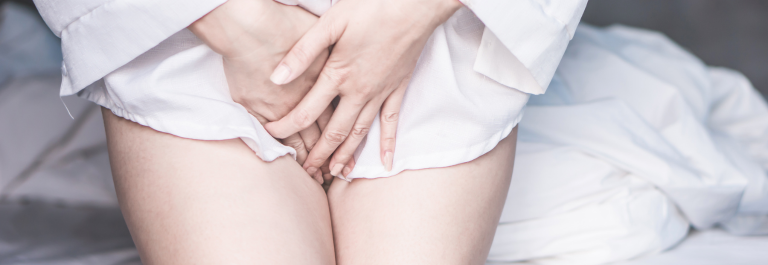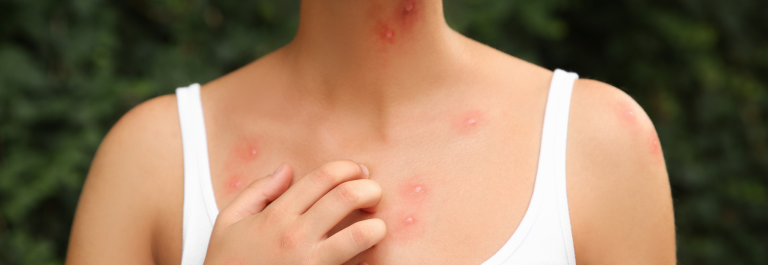Psoriasis is an autoimmune disease that causes the body's skin cells to multiply ten times faster than usual. This skin disorder is characterized by painful, scaly skin patches that appear purplish, brown, or grey on darker skin tones and red, white, or silver on lighter skin. Although it is not contagious, psoriasis affects more than 3% of Americans.
Like eczema, psoriatic diseases are believed to be caused by a combination of genetic and environmental factors and share many of the same symptoms, making it difficult to diagnose psoriasis accurately.
If left unchecked, psoriasis can be a serious and uncomfortable disease. That's why in this post, we'll share everything you need to know about:
-
The main psoriasis symptoms
-
The different types of psoriasis
-
The most common triggers for psoriasis
-
Tips for treating psoriasis naturally
Keep reading to learn more about whether you or your loved one may have psoriasis and how to begin treating your skin safely and effectively today.
Signs and Symptoms of Psoriasis
As we'll explore later in this post, psoriasis develops differently in every person, and the symptoms you experience will be largely determined by the type of psoriasis you develop.
This being said, however, it is useful to recognize the most common symptoms that characterize this disease:
-
Raised, scaly skin patches spread across the scalp, elbows, knees, and lower back
-
Itchy, cracked skin that may flake and bleed in severe cases
-
Cyclic rashes that flare every few weeks
-
Discolored, bumpy skin
-
Sore throat
-
Nail psoriasis leads to the discoloration and pitting of fingernails and toenails, which may cause nails to crumble and detach from the nail bed.
-
Psoriasis tends to coincide with other health conditions such as Crohn's, celiac disease, heart disease, diabetes, metabolic syndrome, sclerosis, fatty liver disease, and obesity.
-
Associated mental health issues linked to stress, anxiety, depression, or low self-esteem
-
Long-term scaring due to intense itching
What Are The Different Types of Psoriasis?
Plaque Psoriasis
This is the most common type of psoriasis, accounting for 9/10 psoriasis cases in America. Here, an overactive immune system causes 'plaques' to develop across the skin, which are raised, bumpy patches built up of dead skin cells. Again, these patches may appear purplish, brown, or grey on dark skin, while on lighter skin, they may appear red with silvery flakes. Psoriasis plaques are often itchy and painful.
In the case of scalp psoriasis, these plaques develop between the hair follicles across the scalp.
Guttate Psoriasis
This skin condition is most common amongst infants, children, or young adults, often developing following the onset of an upper respiratory tract infection, such as strep throat or a sore throat. In cases of guttate psoriasis, small discolored, scaly dots spread across the skin of the torso or limbs.
Inverse Psoriasis (or Intertriginous Psoriasis)
Here inflamed, smooth patches of skin discoloration develop in areas across the body when the skin folds, such as under the breasts, between the buttocks, armpits, or near the groin. This is because inverse psoriasis symptoms are exasperated by friction and sweating.
Pustular Psoriasis
Alongside itchy, scaly skin, this variation is characterized by the development of tiny pus-filled bumps on the palms of your hands or the soles of your feet, made up of dead white blood cells. These bumps may disappear and reappear every few weeks.
Von Zumbusch Psoriasis or Generalised Pustular Psoriasis, is a more severe and potentially life-threatening version of this same variation, and within hours most of the body is covered in pus-filled blisters. This rare strand can cause fever, chills, weight loss, and fatigue, requiring urgent medical attention.
You are more likely to develop pustular psoriasis if you possess one of two specific genes - IL36RN or CARD14.
Erythrodermic Psoriasis
If severe psoriasis is left unchecked, you may develop erythrodermic psoriasis. This serious and potentially life-threatening chronic skin condition requires urgent medical attention, where most of the skin on your body appears severely burnt.
In cases of erythrodermic psoriasis, the skin is impacted by intense itching or burning that may lead to chills, a fever, dehydration, and muscle weakness. Most typically, erythrodermic psoriasis is triggered by bad sunburn or allergic reactions to certain medications such as corticosteroids (otherwise known as 'steroids').
Psoriatic Arthritis
While not strictly a skin condition, according to the National Psoriasis Foundation, 10 - 30% of people with psoriasis also tend to develop psoriatic arthritis. In more extreme cases, this disease is characterized by achy, swollen joints, stiffness, and joint deformity.
Common Triggers for Psoriasis
As explored above, psoriasis is fundamentally an autoimmune disease. This means it's most commonly triggered by infections, skin injuries such as cuts, burns, and bruises, allergic reactions to topical creams or harsh skin care products.
If you have a family history of psoriatic disease, factors that may increase your chances of a psoriasis outbreak include an over-exposure to the sun's ultraviolet rays, pregnancy, and sudden changes in body temperature spurred by cold or hot weather.
It has been proven that smoking also exasperates psoriasis symptoms.
Treatments To Manage Symptoms of Psoriasis
While developing psoriasis may feel overwhelming, there are many treatment options for you or your loved one to consider, helping you regain control and restore your healthy skin.
Topical Treatments and Creams
All psoriatic diseases are characterized by dry skin, so moisturizing is key to any effective treatment plan. Many people typically use topical vitamin D creams containing the active ingredients salicylic acid or anthralin, which help restore healthy cells and soothe painful skin.
Because this skin disease may be exasperated by allergens such as complex fragrances, high-potency chemicals, or other external factors, finding simple, natural skincare alternatives can often be useful.
-
To help moisturize your skin even while washing, we recommend using this Coconut and Sunflower Oil Soap Bar. By combining coconut oil, shea butter, and sunflower oil in soap, this soap offers a fatty cleanser and moisturizer that will leave your skin feeling soothed, soft and supple. It's the best natural soap for eczema, psoriasis, sensitive skin, and more.
-
As a safe daily moisturizer for babies, children, and adults, we suggest using the Organic Manuka Skin Soothing Cream to help treat your psoriasis naturally. This manuka honey cream is an oil-based balm with a touch of water added to create a soft buttery texture that your skin will adore. With absolutely zero added preservatives or fragrances, manuka honey offers anti-bacterial properties, soothing even the most sensitive skin.
You may also wish to combine your moisturizing routine with dry or wet wrapping treatment for more intense relief. This involves moisturizing the skin by applying a natural emollient, as mentioned above, and then covering the area with a thin layer of damp or dry fabric to improve the penetration of the emollient. People find the most relief when this is done overnight or multiple times daily. Read more here to learn about how to dry or wet wrap safely.
Light Therapy
LED lights are aimed at affected areas of the skin at specific wavelengths to help stop inflammation and slow skin cell production.
While it is believed that moderate exposure to the sun's ultraviolet rays may help improve the symptoms of this itchy skin condition, it is vital to note that over-exposure can be risky, particularly given that the skin's barrier is weakened by psoriasis already. Wearing ample sun cream is important to avoid the increased risk of developing skin cancers.
Gentle Clothing
When living with psoriasis, it's important to consider the fabrics and chemicals used to make your clothing. Many common materials used to produce clothes may aggravate your dry, itchy skin, leading to longer-term inflammation and increasing your risk of developing more severe psoriasis varieties.
Ideally, to help give your skin the best chance at healing naturally, you want to reach for soft, breathable clothing. That's why we love Remedywear™. Specifically designed for sensitive skin, all clothing is made with soft silky TENCEL™ and embedded with anti-inflammatory zinc.
This unique fabric reduces itching, improving sleep quality and soothing irritation. Plus, it inhibits the growth of bacteria which can greatly reduce the risk of infection, especially if the skin cracks or bleeds.
For full-body relief, we'd recommend the Remedywear™ Long Sleeve Shirt for Adults or Kids and the Remedywear™ Pants for Adults or Kids. You may also wish to try the Remedywear™ Eczema and Psoriasis Sleeves (Bandages) to target psoriasis in specific problem areas.
What If My Symptoms Don't Go Away?
It is important to note that you should consult your dermatologist or doctor straight away if your rash becomes:
-
Widespread and severe
-
You are in considerable discomfort or pain
-
Your mental health is being impacted due to the appearance of your skin
-
Your symptoms are persistent and do not improve with treatment
Understand Your Psoriasis Better
Take these tips, guidance, and information on board to help you better understand your or your loved one's psoriasis, building an effective and personally-tailored treatment plan for yourself today.










